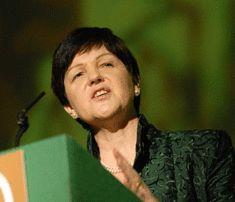
Tesco’s Lucy Neville-Rolfe did her best to alienate every sector of the NFU membership in turn during her presentation at the union’s annual conference, but saved some of her more palatable words for fresh produce.
Speaking in place of injured chief executive Sir Terry Leahy, executive director Neville-Rolfe rampaged through dairy, meat and poultry, drawing varying degrees of disbelief and anger with her perspective on her company’s positive contribution to each sector.
When she moved onto fresh produce, the word which caused similar consternation was “affordable”. She said: “We have made our fruit and vegetables more affordable. Our value range now covers 90 lines - many of them staple produce that [NFU members] grow for us. Sales of fresh produce have risen by over 10 per cent in the last year alone. We are also doing more to market fresh produce, such as aisles dedicated to seasonal fruit and vegetables - peas, strawberries, asparagus.”
She said Tesco has helped British farmers extend their seasons through local sourcing initiatives, and that the UK’s number one is creating serious opportunity for domestic farmers. “This year we expect to sell £400 million of local products in the UK. By 2011, we plan to sell £1 billion worth,” she said.
When questioned after the presentation about returns to growers, Neville-Rolfe said: “There are areas of fruit and vegetables from which you can make a fair, reasonable return, and consumers want more of them.” Without actually airing the obvious intimation - that there are also areas where growers cannot expect to make a fair, decent return, she added. “Affordability helps British growers of lines such as parsnips and Swedes, by making them more available to the poorer families, and that has enabled us to grow the market by encouraging consumers to buy more and be more healthy.”
She also said that Tesco, which has been openly telling some fresh produce suppliers that it wants to announce a £3bn profit in March and asking for their help to achieve that through discounts, is suffering the same economic and fuel problems as its suppliers. But her take on the consequences of that was not what the audience wanted to hear either. “The difficulty when you add costs into a competitive market is that some of those will be passed onto the consumer and others will be passed back to the primary producer,” she said, adding with no hint of irony that at Tesco the six per cent of sales that represents profits is a “relatively small margin” and that farming returns “come and go”.
“That’s why we have to work together and look at the opportunities,” she said. “We want our suppliers to do well.”



